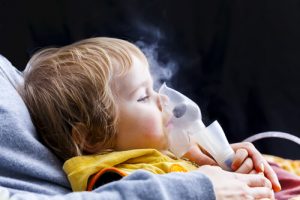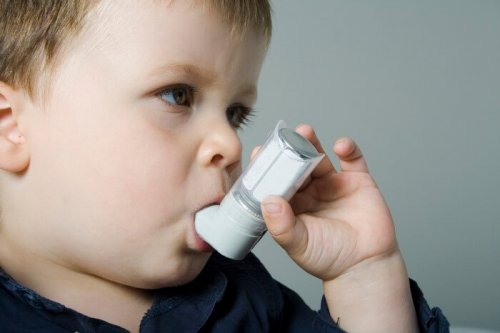9 Asthma Symptoms in Children

In order to act quickly and avoid complications, it’s important to know how to recognize asthma symptoms in children.
There is nothing that makes parents worry more than seeing their child breathe difficultly. Childhood asthma can be one of the causes. This chronic disease produces inflammation and narrowing of the airways, which makes it difficult for air to enter.
According to the World Health Organization, asthma is the most common chronic disease among children. It doesn’t have a cure, but symptoms can be controlled. If it’s well treated, children can lead a normal life.
Although its cause isn’t known for sure, certain situations such as cold weather, allergens, tobacco smoke or certain physical activities can trigger it.
“The symptoms of asthma in children can vary from one individual to another.”
The treatment of asthma in children requires two types of medications. Some help stop the crises and alleviate the asthma symptoms immediately and others control the condition for long periods of time and prevent the onset of other problems.

Asthma Symptoms in Children
- Difficulty breathing. A sign of asthma in children is difficulty breathing. When they have an asthma attack, the airways become narrow. It’s difficult for the child to breathe in and breathe out. They run out of air or breathe faster than normal. In these cases, there may be sinking in the skin of their chest and neck. Since they’re having difficulty breathing, the child may feel anxiety, which makes breathing even harder.
- Wheezing. Wheezing is also one of the common asthma symptoms in children. When the child breathes, you can hear a whistling sound. It becomes more audible when the air is expelled. The sound begins as a low whistle and increases as the asthma attack worsens. This is one of the most recognizable symptoms of this condition. The whistling occurs when the tracks narrow where the air passes when trying to exit.
- Coughing. Another symptom of asthma in children is coughing. Sometimes it can be the only one. If your child is coughing without having had a cold or other circumstance that justifies it, you have to pay attention. Also, if it hinders sleep, wakes the child up at night or appears after physical exercise. The cough can be dry or wet.
- Tiredness. A child who shows constant fatigue without cause may have asthma. The low oxygenation caused by bad breath causes less oxygen to reach the blood and muscles. This causes the body to function more slowly, which makes the child feel exhausted.
More Signs that Indicate the Presence of Asthma
- Pressure in the chest. The feeling of tightness in the chest is also one of the symptoms of asthma in children. If the child complains of pain, pressure or feels as if they were squeezing a rope around their chest, this may be an indication of asthma.
- Nasal Flaring. Another sign of asthma in children, especially in smaller ones, is nasal flaring. The child opens and closes their nostrils when breathing.
- Sighs. A sigh is when they breathe in deeply and breathe out for a longer amount of time. If the child sighs constantly, this may indicate breathing difficulties caused by asthma.
- Throat Clearing. Trying to clear their throat constantly because they feel discomfort can be one of the symptoms of asthma in children.
- Dark circles. Dark bags under their eyes can also be an indicator of asthma.

Variations in Each Case
Asthma symptoms in children can vary from one individual to another. There may be several, all or only one.
Some children may suffer from it frequently, and others only when a trigger is present. Sometimes the symptoms can be confused with those of a common cold.
To diagnose it, your doctor will perform different respiratory system tests. They will also assess family health history and symptoms presented by the child. The important thing is to stay alert if any are present and see if it’s in fact asthma after getting the specialist’s opinion.
All cited sources were thoroughly reviewed by our team to ensure their quality, reliability, currency, and validity. The bibliography of this article was considered reliable and of academic or scientific accuracy.
- Asma Alérgico en Niños. Asma Infantil y alergias. Clínica Universidad de Navarra [Internet]. cun.es. [citado el 22 de enero de 2022]. Disponible en: https://www.cun.es/enfermedades-tratamientos/enfermedades/asma-alergico-ninos
- Peterson-Layne CL, Furman WR. Asma. En: Toma de Decisiones en Anestesiología. Elsevier; 2008. pág. 96-7.
- Praena Crespo M. ¿A qué llamamos asma infantil? Pediatría en primaria [Internet]. 2005 [citado 22 de enero de 2022];7(Supl 2):13-27. Disponible en: https://medes.com/publication/23329
This text is provided for informational purposes only and does not replace consultation with a professional. If in doubt, consult your specialist.








